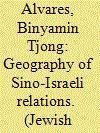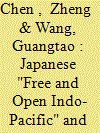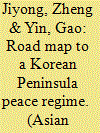|
|
|
Sort Order |
|
|
|
Items / Page
|
|
|
|
|
|
|
| Srl | Item |
| 1 |
ID:
189326


|
|
|
|
|
| Summary/Abstract |
Since 2016, Australia's attitude toward China has taken a turn for the worse, and Sino-Australian relations have seen a significant decline. With regard to the change in Australia's attitude toward China, Chinese scholars initially analyzed it mainly from the perspective of the U.S.-Australia alliance and the China-U.S.-Australia triangle, viewing U.S. influence as the key reason for the change in Australia's policy toward China. Later, Chinese scholars have become increasingly aware of the significant policy autonomy in Australia's China policy and the inadequacy of viewing Australia's China policy from the U.S. perspective. On the one hand, Australia's unique threat perception and interest perception have shaped the characteristics of its China policy; on the other hand, how to effectively balance security interests and economic interests is a long-standing dilemma faced by Australia under the strategic competition between China and the U.S. The Australian government has shown a degree of policy flexibility in its approach. The limited coercive economic measures taken by China against Australia have sent clear policy signals to Australia and have become a factor influencing its policy towards China. In the coming period, although no obvious opportunity for improvement in China-Australia relations is in sight, both sides may be more prudent and pragmatic strategically, and China-Australia relations can be expected to remain basically stable at a low level.
|
|
|
|
|
|
|
|
|
|
|
|
|
|
|
|
| 2 |
ID:
170039


|
|
|
|
|
| Summary/Abstract |
If the US alliance system in the Asia-Pacific endures the current divergence of strategic aims and national identities, it will do so under enormous stress.
|
|
|
|
|
|
|
|
|
|
|
|
|
|
|
|
| 3 |
ID:
143552


|
|
|
|
|
| Summary/Abstract |
China’s reform and opening-up process has coincided with the expansion of globalisation. Many people have expressed the belief that China has been the biggest winner in globalisation, and some of them even believe that the country has begun to take initiatives in globalisation instead of merely being affected by it. This article reviews the foundations of China’s engagement with globalisation, and shows how Chinese scholars have approached the study of globalisation for the past three decades. By further examining the Chinese authorities’ official stance, China’s changing identity and newly announced strategic initiatives, the article argues that the relationship between China and globalisation has undergone a certain transition, in which the country has been increasing its power and will to reshape and engage the process of globalisation.
|
|
|
|
|
|
|
|
|
|
|
|
|
|
|
|
| 4 |
ID:
124361


|
|
|
|
|
| Publication |
2012.
|
| Summary/Abstract |
The People's Republic of China was formally founded in October 1949, only eleven months after the state of Israel. Although situated on opposite ends of the Asian continent, both nations began as poor, agrarian societies, early in their formation facing many similar challenges such as territorial threats. However, the geographic distance between the Middle Kingdom and the Holy Land, their location vis-à-vis Europe and the West, and their contrasting experience with the former colonial powers decisively influenced their world outlook, keeping these two countries at arm's length for decades. The United States in particular played a decisive role as an impediment to the natural growth of a stronger relationship between these two ancient nations that have much in common. Now, as China and Israel complete the twentieth year of diplomatic relations, and as the Sino-Israeli relationship appears more independent from American influence than ever before, the two nations are finally poised to explore the abundance of synergies that bind them through deeper and broader interaction and a shared goal of bringing those benefits to the wider world.
|
|
|
|
|
|
|
|
|
|
|
|
|
|
|
|
| 5 |
ID:
189324


|
|
|
|
|
| Summary/Abstract |
This article examines the Chinese assessment of and responses toward the Japanese "Free and Open Indo-Pacific" (FOIP) concept against the background of evolving Sino-Japanese relations. Addressing both its security and economic concerns, the FOIP is Tokyo's top-level regional strategy design in the context of China's rise. The development of the Japanese FOIP has been fluctuating with the evolution of Sino-Japanese relations and the emerging Sino-U.S. strategic contest over the past decade. The complexity and the fluid nature of the Japanese FOIP has prompted varying assessments and policy recommendations among Chinese analysts, which can be roughly divided into three categories: the hardline approach, the hedging approach, and the docking approach. Meanwhile, remarks of Chinese officials on the Japanese FOIP remain elusive, carefully differentiating between the Indo-Pacific strategy of the United States and that of Japan. All of these aspects reveal the complexity and flexibility of China's policies. The COVID-19 pandemic and the recent domestic changes of Japan and the U.S. have further complicated geopolitical and geoeconomic tensions. As a consequence, the Sino-Japanese relationship has become awkward once again.
|
|
|
|
|
|
|
|
|
|
|
|
|
|
|
|
| 6 |
ID:
172894


|
|
|
|
|
| Summary/Abstract |
The U.S. government considers “power competition” to be the nature of the relations among big powers, and that it will have an impact on the evolving nuclear order in the near future. When big powers worry about power challenges from their rivals, they may use the influence of nuclear weapons to defend their own power and therefore intensify the danger of nuclear confrontation. We need to manage the nuclear relations among nuclear-weapon states and nuclear-armed states to avoid the risk of nuclear escalation. The fact is that big powers including the United States have neither the interest nor the capability to expand their power, and understanding this might cause big powers to lose their interest in power competition. If we promote dialogue among nuclear-weapon states and nuclear-armed states on their strategic objectives, it is possible to reduce the power competition that results from misperceptions and overreactions. Some other factors, for example, non- nuclear technologies and multinuclear players, could complicate the future nuclear order. We therefore need to manage these factors as well and develop international cooperation to mitigate nuclear competition.
|
|
|
|
|
|
|
|
|
|
|
|
|
|
|
|
| 7 |
ID:
137189


|
|
|
|
|
| Summary/Abstract |
Sustainable peace and stability need an institutional guarantee. Based on the unique logic of its Korean peninsula policy, China has sketched a Chinese-style Korean Peninsula Peace Regime that comprises logic positioning, strategic objectives and priorities, a mechanism, a timetable, and a road map. The basic logic of the peace regime, the aim of which is long-term peace and stability on the Korean peninsula, is that it should include security but also integrate security with economy and culture.
|
|
|
|
|
|
|
|
|
|
|
|
|
|
|
|
|
|
|
|
|